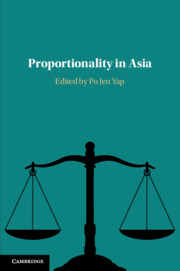Book contents
- Proportionality in Asia
- Proportionality in Asia
- Copyright page
- Contents
- Figures
- Tables
- Contributors
- Acknowledgments
- Abbreviations
- Introduction
- Part I Structured Proportionality
- 2 More Structure, More Deference
- 3 Proportionality in Taiwan
- 4 Proportionality in South Korea
- Part II Anemic / Ad Hoc Proportionality
- Part III Doctrinal Equivalents of Proportionality
- Conclusion
- Index
2 - More Structure, More Deference
Proportionality in Hong Kong
from Part I - Structured Proportionality
Published online by Cambridge University Press: 18 September 2020
- Proportionality in Asia
- Proportionality in Asia
- Copyright page
- Contents
- Figures
- Tables
- Contributors
- Acknowledgments
- Abbreviations
- Introduction
- Part I Structured Proportionality
- 2 More Structure, More Deference
- 3 Proportionality in Taiwan
- 4 Proportionality in South Korea
- Part II Anemic / Ad Hoc Proportionality
- Part III Doctrinal Equivalents of Proportionality
- Conclusion
- Index
Summary
This chapter examines the proportionality test as applied in Hong Kong’s constitutional jurisprudence. In addition to tracing the evolution of proportionality doctrine from the British colonial era to the present day, the paper advances two broad claims. First, it argues that the Hong Kong judiciary, led by the Court of Final Appeal (CFA), has gradually inserted more structure to the proportionality test, but has also become more deferential to governmental authority and expertise in constitutional rights adjudication. The CFA’s landmark judgment in Hysan Development Co Ltd v Town Planning Board (2016) is most significant in this regard, as it enabled the use of a very deferential standard of review – “manifest” unreasonableness – in a wide range of fundamental rights cases. Second, Hysan’s introduction of a fourth step to the proportionality test has had little, if any effect on subsequent judgments. The fourth step calls for courts to balance the societal benefits of an impugned law against the harm it imposes on individual rights. Thus far, however, Hong Kong courts have refrained from taking this balancing exercise seriously, even when the burden on those whose rights are affected appears to be substantial or excessive.
- Type
- Chapter
- Information
- Proportionality in Asia , pp. 25 - 59Publisher: Cambridge University PressPrint publication year: 2020
- 3
- Cited by

